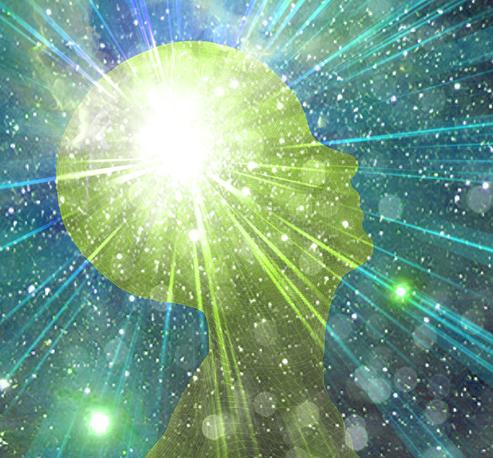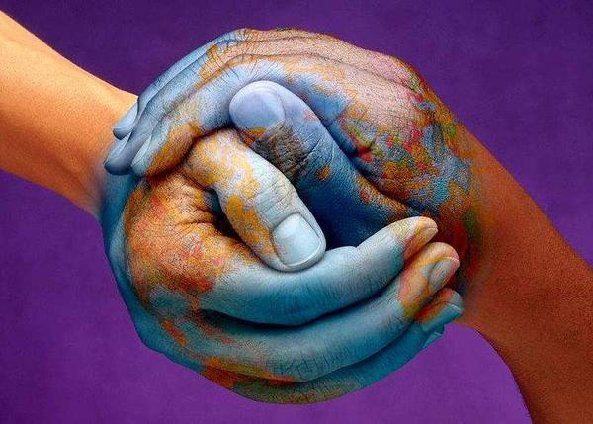The Future We Create

Peace on earth is and has always been an elusive goal, one lost in the endless shuffle of billions of feet striving to find some balance within their own domain. The world remains beset by our own demons which century after century of living have reinforced rather than silenced. There have been epic struggles between nations, cultures, races and religions, between the rich and the poor and those who see believe they have a right to rule and those who would be led justly and so on. There is little anyone can do to change this directly for there are only two things we can do: we can change ourselves and we can inspire others to change.
We all would like to have a world that is free or at least freer of the types of conflicts that have plagued us. However, most mistake the source of them in that they see others as doing this to the world. This is not accurate for the source of these conflicts lies within each of us. You cannot have a Hitler without people willing and able to go along. We have seen this in action lately in the Middle East where the “Arab Spring” has become a phenomenon. A large number of people there are showing they are no longer content to live without freedom from being dictated to. It is not something that has happened in the west much though mostly because we have become accustomed to our “creature comforts” and will not forsake them easily.
Each of us can be that change but all too often we wait for someone else to do that as a trigger for our own change. This begs such questions as “Why are we waiting?”, “What are we waiting for?” and “Who are we waiting for?” The answers so such questions are not likely to be found without thoughtful and mindful consideration. Further, this will not occur unless one there is an impetus to and desire for change. This is what I was referring to when I stated:
“How does one go about making the decision to develop oneself, to grow within? This question has as many answers as there are people. No one issue, problem or life situation provides the impetus to proceed. For instance, a series of problems may arise, one significant event has been a trigger that pushes us to grow, or we find we are driven to it from within. Where we find the intent is irrelevant, having it is what matters. For some, finding the intent may be difficult.
One might feel that when serious issues arise one simply goes about fixing it. This presumes one has the intent already, and need not find it. What about those people who have difficulty getting themselves started? There is also hope for those in this category: you must plant the seeds for tomorrow. We do this by setting up a thought process similar to the following: “I will develop the intent, and I will be you fill in the blank>”. This act starts the process of developing one’s intent to grow.”(1)
We grow accustomed to who we have become even when who we are may not be to our liking. It’s no one’s fault that we are who we are, we cannot even blame ourselves for we are who we are and like what we like because of our core self and the minds we manifest as we react to our experiences. They are not simply the product of our conscious thoughts about them, they are the result of how ALL our thoughts, conscious and non-conscious, interact and the relationships they form.
These relationships manifest our beliefs for our beliefs are thoughts that arise out of other thoughts. One cannot have a belief about something without first having a thought about what that something is separate from thoughts about it. For instance, you cannot believe that smart people can fix the worlds problem without first having notions about the world having problems, why they haven’t been “fixed” already, what makes a person smart, how smarts can be applied and their effectiveness and so on.
Our thoughts form a complex web, which I call our mental house. This web of thoughts is our mind or our ego as some would refer to it, and it is our mind that determines what choices we make, what we like and don’t like. Our thoughts guide our choices and our experiences so our trials and tribulations are primarily the result of our minds. If we have outcomes that we do not like their source is not outside, it comes from within.

At the personal level, our external world and interactions with it are a reflection of our internal one. Therefore, the issues that manifest in the external world, the anger, hate and pain and so on that result in strife between or within countries isn’t something imposed on us, it is something we have imposed on ourselves. This is why the phrase “be the change you would see in the world” is so powerful.
Change can be easy but this is rarely the case for as we become accustomed to our situations our mind hardens and becomes more rigid. The rigid mind resists change, whether helpful or positive or not, because it seeks to maintain the status quo. Fortunately, the mind, even the non-conscious aspects of which we are generally unaware, takes its cues from our self conscious awareness. By formulating the intent and desire to change we send a powerful message to our mind. Our mind will respond though there will be resistance, but we need to remember that the source of our resistance is merely other thoughts we have and we can change them.
I have written at length about how we do this and the process itself is rather simple. We start by paying attention to the outcomes in our lives and rather than look without for why they are occurring we look within. This passage, posted by Heart Highlights on Facebook speaks to it clearly:
“You must constantly ask yourself these questions: Who am I around? What are they doing to me? What have they got me reading? What have they got me saying? Where do they have me going? What do they have me thinking? And most important, what do they have me becoming? Then ask yourself the big question: Is that okay? Your life does not get better by chance, it gets better by change.”~Jim Rohn
This passage makes a direct statement about mindfulness and infers, in terms of growth, that taking ownership over the events in our lives is the way forward. Complacency is one of our largest challenges. We have all heard the phrase “Better the devil you know than the devil you don’t”. This idiom means that it is often better to deal with someone or something you are familiar with and know, even if they are not ideal, than take a risk with an unknown person or thing. You would be wise if you recognize that this is a trap and cages our powerful spirit because life isn’t about surety, it isn’t about comfort, it isn’t about being safe, it is about experiencing and by exploring through experiences we learn, grow and expand ourselves.
Change is as inevitable as it is unavoidable even when we seek to resist it. We change with every experience and we can either change by increasing our resistance (becoming more resolute is a change) or by letting go of our resistance and reluctance. So, given change is inevitable we have two fundamental choices, let the change happen on its own and live with the consequences or make conscious choices.
Think of it this way, if we leave it to chance and never explore “the whys behind what happens”, hence we cannot attribute outcomes to choices. This means we have no conscious control of and cannot give directions to the changes that occur. We stand a far better chance of doing so when we act consciously as Jim Rohn suggests in the quote above.
To change the world it is not sufficient to get angry about the injustices we perceive, in fact it is counter-productive to do so. Yes, at the early stages of growth anger can be a great motivator; however, our anger negates much of positive things we may be doing. Think about it... if I want someone to be loving and caring rather than hateful and selfish does getting angry with them for their inability to do so help them to be more this way?
We should be champions for rather than fighters against something. For example, I am a big hockey fan and have a favourite team which I cheer for. What I do not do is cheer against the other team or for the other team to lose. I am also a big supporter of non-violent protest, but that does not mean I will condemn those who choose a different way. When we do not act in this manner we are actually perpetuating the very problems we are seeking to eliminate. We must stand for something and understand what that is and it must be more than vague notions, it is the only way to make positive change.
The same thing applies to our everyday lives. When we get angry with someone for what they have done, or what we perceive they have done, we are not helping them change or ourselves to grow. Instead we are actually doing the opposite. We may feel justified in our anger in that we may believe that if we are angry enough they may see the “error of their ways” or that if we are not angry then they may think we approve or agree with them and so on. They do not learn that what they have done is not a caring, good or beneficial thing; instead they learn to resist doing so, avoid doing it, try to avoid getting caught in the future or they may even do it more in the future. None of these are very helpful.
It takes great patience and love to allow others to make mistakes that cause us problems (which are actually opportunities for growth) without acting in kind. Some would call such people wimps, but nothing could be further from the truth. It takes far more courage and strength to respond to anger or hate with love and compassion than it does to react with our own anger or hate. Some would also argue that if we do this people will see us as a door mat and take advantage of us. This too is an illusion for if one is acting out of pure, unconditional love and compassion they will also have that for themselves and will not allow themselves to be used or abused by others.
One’s ability to live their lives in this fashion does require one have a strong sense of self and faith in what they believe to be true. This is what I was referring to in the essay The One and The All (part 5 of the Awakening Our Gifts series) where I stated:
“We are an expression of the Cosmos and each life is established as a result of the needs of our higher self not the lower self or “us”. If we want to fully develop our gifts then we must come to understand this and align ourselves with it. This is not easy to do for we have lived our whole lives as if we independent and are free to make choices and our ego’s become quite strong. The ego protects itself, it wants to remain in control; however, our awareness is restricted by the illusion of “I” we have built, and this illusion must be torn down in order for us to have greater access to our true gifts.
We get beyond this by aligning ourselves with the Cosmos, even if we do not quite know what that means. If you have started to work to reduce the notion of independence from everything then the next step is to embrace the interdependence or inter-connectivity we all share. This requires us to realize that everything and everyone is important, that they matter. And with this realization we begin to understand that the struggles we all go through are a necessary step in the process of our higher selves awakening. This leads us to compassion for everything and everyone, and to extend our love beyond ourselves and a few select people to ALL.” (2)
I will add that it also helps when we see ourselves as part of the whole and not separate from it, that we are not just flesh and bones and that when we die it is only the body that ceases to be. Further, when we speak of being the change we want to see in the world we are reflecting what is actually the case, namely that the problems in the world are a reflection of the problems we have and not the other way around. Getting angry over what we see around us and blaming others for it does not help one bit. For the world to change we must change.
So, if you feel strongly about something then either do something about it or let it go. We must have the courage of our convictions rather than the anger of our angst. By getting angry about what we see in the world we are adding to the problem. When you do something do it from a place of love and compassion. Acting from hurt, pain, anger or hate perpetuate the very problems we seek to resolve. Remember that how we react and act as a individuals and then as a whole determines the future we create.

© 2013 Allan Beveridge
Last Updated: January 13, 2019
References:
